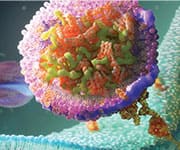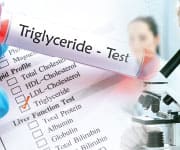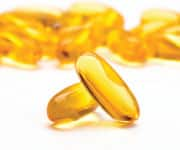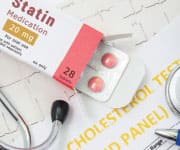Life Extension Magazine®
Everyone has heard about the cardiovascular risks posed by high LDL cholesterol.

But even when dangerous cholesterol particles are controlled, another lipid called triglycerides can block blood flow to the heart or brain.
Conventional medicine defines elevated triglycerides when blood levels exceed 149 mg/dL.1
Life Extension has long advocated that the reference range for optimal triglyceride levels should be less than 100 mg/dL.
Omega-3 fatty acids can lower triglycerides by as much as 50%.2
A recent meta-analysis found that EPA and DHA intake was associated with a 35% reduced risk of fatal heart attacks.3
Why Triglycerides Matter

Triglycerides consist of three (“tri”) fatty acids attached to a glycerol (sugar alcohol) backbone. They are in food and in our body fat.4,5
After eating, your body converts some calories it doesn’t need to triglycerides that are stored in fat cells. Triglycerides are released from fat storage for energy production between meals. Your body also makes triglycerides.
High triglyceride levels are strongly associated with metabolic disturbances that increase heart attack and ischemic stroke risk.6
Elevated levels are also associated with dangerous small-dense LDL particles,7 very low-density lipoproteins (VLDL),8 and cholesterol-enriched remnant lipoprotein particles.9 These are all known promoters of atherosclerosis.10-12
Life Extension considers optimal fasting triglyceride levels to be below 100 mg/dL. Individuals at high risk for cardiovascular events should strive for even lower levels.
How Fish Oil Lowers Triglycerides
Oral intake of fish oil containing the omega-3 fatty acids EPA and DHA is a proven way to bring triglycerides down.
Fish oil lowers triglycerides by:13-17
- Increasing the clearance of triglyceride-rich lipoproteins from the bloodstream,
- Decreasing the liver’s production and secretion of triglyceride-rich lipoproteins, and
- Increasing the activity of lipoprotein lipase, which breaks down triglycerides so the body’s tissues can use the fatty acids.
Fish Oil for Prevention

Scientists reviewed 22 clinical trials of EPA and/or DHA use in 1,637 healthy adults with normal or borderline-high triglycerides.18
In studies ranging from two weeks to a year, daily oral intake of 300-4,900 mg of omega-3s reduced fasting triglyceride levels by 4%-51%.18
Higher doses and longer time periods of taking fish oil generally produced greater benefits.18
A recent meta-analysis of 40 clinical trials found that EPA and DHA intake was associated with significant reductions in the risk for cardiovascular disease death.3
Specifically, this study found that EPA and DHA supplementation is associated with a reduced risk of:
- Fatal heart attack (35%)
- Heart attack (13%)
- Coronary heart disease events (10%)
- Coronary heart disease mortality (9%)
The study, concluded that supplementation with EPA and DHA reduced the risk of coronary heart disease, including heart attack.
What you need to know

Optimal Triglyceride Control with Fish Oil
- Elevated triglycerides promote athero-sclerosis and cardiovascular disease.
- Life Extension considers optimal fasting triglyceride levels to be well below 100 mg/dL.
- Fish oil, which includes the omega-3 fatty acids EPA and DHA, lowers triglycerides by increasing their removal from the bloodstream and decreasing their release from the liver.
- Omega-3 fatty acids can reduce triglycerides by up to 50% in people with high levels. They also lower triglycerides in people with moderately elevated levels.18
- One meta-analysis found that EPA and DHA intake was associated with a 35% reduced risk of fatal heart attacks.3
Triglycerides in Obesity
Triglycerides tend to rise with increasing body weight. Fish oil helps combat this.
When 210 overweight or obese adults supplemented with 3,000 mg of omega-3 daily for six weeks, fasting triglycerides decreased by 15% in men and 17% in women.19
In a longer, 16-week placebo-controlled trial of 152 overweight or obese older adults, daily oral intake of fish oil reduced triglycerides by 24%.20
In these studies, fish oil helped bring triglycerides closer to optimal levels.
Benefits in Other Conditions
High triglycerides are often related to type II diabetes and non-alcoholic fatty liver disease.
Insulin resistance, which contributes to diabetes, is associated with an increase in the liver’s secretion of triglycerides. Clearance of triglycerides from the circulation tends to be slower in people with insulin resistance.21
In a three-month trial of 64 overweight/obese adults at increased risk for type II diabetes, oral intake of 2,000 mg fish oil daily led to a 16.54% decrease in fasting triglyceride levels.21
Excess fat buildup in the liver, such as in non-alcoholic fatty liver disease, is associated with an increased incidence of cardiovascular disease.22
Recently, scientists reviewed 18 placebo-controlled trials of fish oil in individuals with non-alcoholic fatty liver disease. Fish oil significantly lowered triglycerides in an impressive 89% of the trials.23
Fish Oil with Statins

Some drugs that lower LDL cholesterol also decrease triglycerides. But they may not do enough.17,24,25
About one-third of all patients taking statin medications still have fasting triglyceride levels over 150 mg/dL. This leaves them vulnerable to cardiovascular problems.26
Fish oil has proven to be effective for reducing major adverse cardiovascular events.27
A major trial called REDUCE-IT included 8,179 high-risk heart patients who had LDL cholesterol controlled by statins yet still had elevated triglycerides. They were given 4,000 mg of a prescription EPA-only fish oil or a placebo daily for about five years.28
The fish oil group had a median reduction from baseline in fasting triglycerides of 19.7% within one year compared to placebo. The placebo group had a slight increase in triglycerides.
The fish oil group also had a 25% reduction in the risk of major cardiovascular events (beyond that provided by statin treatment), compared to the placebo group.
Summary

Elevated triglycerides increase risk of heart attack and stroke.
Fish oil containing the omega-3 fatty acids EPA and DHA can significantly lower triglycerides when consumed in sufficient amounts.
To promote healthy triglyceride levels, Life Extension suggests daily consumption of at least 2,000 mg of EPA/DHA from high-quality fish oil and/or regular consumption of cold-water fish.
If you have any questions on the scientific content of this article, please call a Life Extension Wellness Specialist at 1-866-864-3027.
References
- Available at: https://www.uptodate.com/contents/hypertriglyceridemia. Accessed September 13, 2021.
- Available at: https://www.ncbi.nlm.nih.gov/books/NBK459368/. Accessed September 13, 2021.
- Bernasconi AA, Wiest MM, Lavie CJ, et al. Effect of Omega-3 Dosage on Cardiovascular Outcomes: An Updated Meta-Analysis and Meta-Regression of Interventional Trials. Mayo Clin Proc. 2021 Feb;96(2):304-13.
- Bayly GR. Lipids and disorders of lipoprotein metabolism. In: Marshall WJ, Lapsley M, Day AP, Ayling RM, editors. Clinical Biochemistry: Metabolic and Clinical Aspects: Churchill Livingstone; 2014:702-36.
- Available at: https://www.mayoclinic.org/diseases-conditions/high-blood-cholesterol/in-depth/triglycerides/art-20048186. Accessed September 14, 2021.
- Ninomiya JK, L’Italien G, Criqui MH, et al. Association of the metabolic syndrome with history of myocardial infarction and stroke in the Third National Health and Nutrition Examination Survey. Circulation. 2004 Jan 6;109(1):42-6.
- Austin MA, Breslow JL, Hennekens CH, et al. Low-density lipoprotein subclass patterns and risk of myocardial infarction. JAMA. 1988 Oct 7;260(13):1917-21.
- Berglund L, Brunzell JD, Goldberg AC, et al. Evaluation and treatment of hypertriglyceridemia: an Endocrine Society clinical practice guideline. J Clin Endocrinol Metab. 2012 Sep;97(9):2969-89.
- Nordestgaard BG, Benn M, Schnohr P, et al. Nonfasting triglycerides and risk of myocardial infarction, ischemic heart disease, and death in men and women. JAMA. 2007 Jul 18;298(3):299-308.
- Hodis HN, Mack WJ, Dunn M, et al. Intermediate-density lipoproteins and progression of carotid arterial wall intima-media thickness. Circulation. 1997 Apr 15;95(8):2022-6.
- Hodis HN, Mack WJ. Triglyceride-rich lipoproteins and progression of atherosclerosis. Eur Heart J. 1998 Feb;19 Suppl A:A40-4.
- Austin MA, Krauss RM. LDL density and atherosclerosis. JAMA. 1995 Jan 11;273(2):115.
- Shabrina A, Tung TH, Nguyen NTK, et al. n-3 PUFA and caloric restriction diet alters lipidomic profiles in obese men with metabolic syndrome: a preliminary open study. Eur J Nutr. 2020 Oct;59(7):3103-12.
- Skulas-Ray AC, Wilson PWF, Harris WS, et al. Omega-3 Fatty Acids for the Management of Hypertriglyceridemia: A Science Advisory From the American Heart Association. Circulation. 2019 Sep 17;140(12):e673-e91.
- Guo XF, Li X, Shi M, et al. n-3 Polyunsaturated Fatty Acids and Metabolic Syndrome Risk: A Meta-Analysis. Nutrients. 2017 Jul 6;9(7):703.
- Oscarsson J, Hurt-Camejo E. Omega-3 fatty acids eicosapentaenoic acid and docosahexaenoic acid and their mechanisms of action on apolipoprotein B-containing lipoproteins in humans: a review. Lipids Health Dis. 2017 Aug 10;16(1):149.
- Backes J, Anzalone D, Hilleman D, et al. The clinical relevance of omega-3 fatty acids in the management of hypertriglyceridemia. Lipids Health Dis. 2016 Jul 22;15(1):118.
- Leslie MA, Cohen DJ, Liddle DM, et al. A review of the effect of omega-3 polyunsaturated fatty acids on blood triacylglycerol levels in normolipidemic and borderline hyperlipidemic individuals. Lipids Health Dis. 2015 Jun 6;14:53.
- Rudkowska I, Julien P, Couture P, et al. Cardiometabolic risk factors are influenced by Stearoyl-CoA Desaturase (SCD) -1 gene polymorphisms and n-3 polyunsaturated fatty acid supplementation. Mol Nutr Food Res. 2014 May;58(5):1079-86.
- Kuszewski JC, Wong RHX, Wood LG, et al. Effects of fish oil and curcumin supplementation on cerebrovascular function in older adults: A randomized controlled trial. Nutr Metab Cardiovasc Dis. 2020 Apr 12;30(4):625-33.
- Thota RN, Acharya SH, Garg ML. Curcumin and/or omega-3 polyunsaturated fatty acids supplementation reduces insulin resistance and blood lipids in individuals with high risk of type 2 diabetes: a randomised controlled trial. Lipids Health Dis. 2019 Jan 26;18(1):31.
- Kasper P, Martin A, Lang S, et al. NAFLD and cardiovascular diseases: a clinical review. Clin Res Cardiol. 2021 Jul;110(7):921-37.
- Lee CH, Fu Y, Yang SJ, et al. Effects of Omega-3 Polyunsaturated Fatty Acid Supplementation on Non-Alcoholic Fatty Liver: A Systematic Review and Meta-Analysis. Nutrients. 2020 Sep 11;12(9).
- Laufs U, Parhofer KG, Ginsberg HN, et al. Clinical review on triglycerides. Eur Heart J. 2020 Jan 1;41(1):99-109c.
- Farnier M, Zeller M, Masson D, et al. Triglycerides and risk of atherosclerotic cardiovascular disease: An update. Arch Cardiovasc Dis. 2021 Feb;114(2):132-9.
- Boden WE, Bhatt DL, Toth PP, et al. Profound reductions in first and total cardiovascular events with icosapent ethyl in the REDUCE-IT trial: why these results usher in a new era in dyslipidaemia therapeutics. Eur Heart J. 2020 Jun 21;41(24):2304-12.
- O’Keefe JH, Jacob D, Lavie CJ. Omega-3 Fatty Acid Therapy: The Tide Turns for a Fish Story. Mayo Clin Proc. 2017 Jan;92(1):1-3.
- Bhatt DL, Steg PG, Miller M, et al. Cardiovascular Risk Reduction with Icosapent Ethyl for Hypertriglyceridemia. N Engl J Med. 2019 Jan 3;380(1):11-22.

